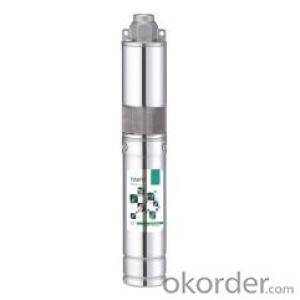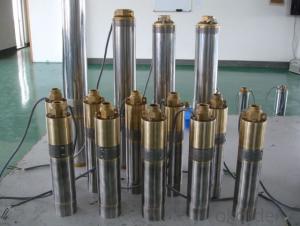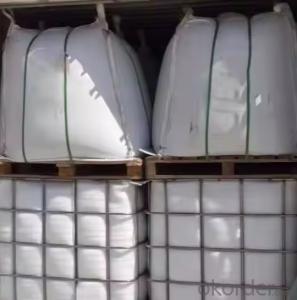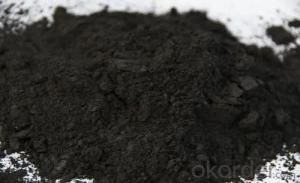3TSS/4TSS SOLAR PUMP stainless steel CE, solar panel
- Loading Port:
- Shanghai
- Payment Terms:
- TT OR LC
- Min Order Qty:
- 50 pc
- Supply Capability:
- 100000 pc/month
OKorder Service Pledge
OKorder Financial Service
You Might Also Like
1.APPLICATION AREA:This project products are mainly used in dry region for irrigation of agriculture, It can be used for drinking water and
living water. The living condition could be much improved. It also can be used for fountains.2.MATERIAL OF PARTS:Outlet: stainless steel
Pump body: stainless steel
Motor body: stainless steel
Bearing: C&U
3.ADVANCED TECHNOLOGY:1.Application innovation
Compared with the traditional alternating current machine, the efficiency is improved 25% by the permanent magnetism, direct current, brushless, non-sensor motor.
2.Technics innovation
Adopt double plastic package for rotor and stator, motor insulation≥300MΩ, the motor security was much improved.
3.Structure innovation
Oil filling, convenient installation and environmental protection4.HIGHLIGHTSa.Energy-saving and environment-protected green products
b.High technique products adopting MPPT and DSP chip technique.
c.100% copper wire, cold-rolled silicon steel sheet
d.CE certificate
e.Advanced three phase brushless DC motor
f.Stainless steel 316 screws
g.3 years warranty5.PRINCIPLE OF OPERATION:Solar panel collects sunlight→DC electricity energy → solar controller(rectification,stabilization,amplification,filtering)→available DC electricity→(charge the batteries)→pumping water6.ADVANTAGES OF SOLAR PUMP SYSTEM:A.It is easier and more widely used than any other dynamoelectric driven pumps.
B.It is more economical and more environmentally friendly.7.MODEL SELECTION:a.The power of solar panel = power of pump ×1.3
The voltage of solar panel = the voltage of pump
The controller should be matched
b.Select the batteries according to the following formulas:
The use hour of battery =
The battery capacity ÷(the machine power÷the battery voltage)×0.6 For example,the machine power is 200W, the battery
capacity is 100AH,the voltage is 12V,and the battery is fully charged,then the use hour is:100÷(200÷12)×0.6=3.6hours
c.The battery capacity=
the use hour ÷0.6×(the machine power÷the battery voltage) For example,the machine power is 200W,the battery voltage
is 12V,and the battery need to be used for 3.6hours,then the battery capacity is:3.6÷0.6×(200÷12)=100AH

- Q:Can a solar pump be used for water supply in a remote research facility?
- Yes, a solar pump can be used for water supply in a remote research facility. Solar pumps are a reliable and sustainable solution that can effectively provide water in areas where traditional power sources are not easily accessible. The use of solar energy allows for a cost-effective and environmentally friendly water supply system, making it a suitable choice for remote research facilities.
- Q:Can a solar pump be used for sewage or wastewater treatment?
- Sewage or wastewater treatment can indeed make use of a solar pump. These pumps are widely employed in various settings, including agriculture, residences, and industries. When it comes to sewage or wastewater treatment, solar pumps prove valuable in transferring or circulating the sewage or wastewater throughout the treatment system. The operation of solar pumps involves the conversion of solar energy into electrical energy, which then powers the pump. Consequently, these pumps offer an eco-friendly and cost-effective choice for sewage or wastewater treatment systems, as they do not rely on fossil fuels or electricity from the grid. Solar pumps find utility in transporting sewage or wastewater from one treatment stage to another. For instance, they can move the substance from the settling tank to the filtration unit or pump it to the disinfection stage. Furthermore, they facilitate the recirculation of wastewater within the treatment system, ensuring sufficient mixing and contact time with treatment chemicals or biological agents. Moreover, solar pumps can be seamlessly integrated with other components of a wastewater treatment system. This includes solar-powered aerators for oxygenation or solar-powered UV disinfection systems. The result is a comprehensive solar-powered solution for sewage or wastewater treatment, reducing dependence on conventional energy sources and minimizing the carbon footprint of the treatment process. Nevertheless, it is crucial to carefully design and size a solar pump for sewage or wastewater treatment, taking into account factors such as the required flow rate, head pressure, and the specific demands of the treatment system. Additionally, regular maintenance and monitoring of the solar pump system are vital to guarantee optimal performance and durability.
- Q:Can a solar pump be used for industrial applications?
- Yes, a solar pump can be used for industrial applications. Solar pumps are increasingly being utilized in industries such as agriculture, water treatment, and manufacturing. They are reliable, cost-effective, and environmentally friendly alternatives to traditional pumps that rely on fossil fuels or grid electricity.
- Q:Can a solar pump be used for water supply in oil refineries or petrochemical plants?
- Yes, a solar pump can be used for water supply in oil refineries or petrochemical plants. Solar pumps are highly versatile and can be used in various industrial applications, including providing water for industrial processes in oil refineries and petrochemical plants. They offer a sustainable and cost-effective solution by harnessing solar energy to power the pumps, reducing reliance on traditional energy sources and minimizing operational costs. Additionally, solar pumps are often designed to be highly reliable and can operate in remote locations with minimal maintenance requirements, making them suitable for the specific needs of oil refineries and petrochemical plants.
- Q:Can a solar pump be used for water supply in community gardens or urban farming projects?
- Yes, a solar pump can be used for water supply in community gardens or urban farming projects. Solar pumps are a sustainable and environmentally friendly solution as they utilize the energy from the sun to pump water. They are ideal for remote locations with limited access to electricity and can efficiently provide water for irrigation and other agricultural needs. Additionally, solar pumps require minimal maintenance and operating costs, making them a practical choice for community gardens and urban farming projects.
- Q:Can a solar pump be used in areas with limited access to electricity for backup systems?
- Yes, a solar pump can be used in areas with limited access to electricity for backup systems. Solar pumps rely on solar energy to operate, making them ideal for remote areas without reliable electricity supply. They can provide a sustainable and cost-effective solution for water pumping needs in such areas, ensuring access to water even during power outages or when grid electricity is unavailable.
- Q:Are there any limitations to using a solar pump?
- Yes, there are some limitations to using a solar pump. One limitation is that solar pumps are dependent on sunlight, so they may not work efficiently or at all on cloudy or rainy days. Another limitation is that the amount of water pumped by a solar pump is directly related to the intensity of sunlight, so it may vary throughout the day and throughout the seasons. Additionally, solar pumps can be more expensive to install compared to traditional pumps, although they can save money in the long run due to lower operational costs.
- Q:Does the balcony wall - mounted solar energy require a circulating pump?
- Now the mainstream balcony wall is a natural cycle, so do not need to install the circulating pump. Circulation pump is used to do the forced circulation. The so-called natural circulation, is your home balcony collector (flat collector or U-tube collector) to absorb solar light heat, the collector medium using cold water sink hot water floating automatically heat will be passed to the tank in. If your collector is higher than the tank, or because the pipeline climbing and other reasons can not be a natural cycle, it is necessary to increase the circulating pump. Solar energy in the natural cycle of the best, plus the pump is not good. Waste money, and easy to bad, if the bad quality and noise.
- Q:Can a solar pump be used for water supply in off-grid research stations?
- Yes, a solar pump can be used for water supply in off-grid research stations. Solar pumps are designed to use solar energy to power the pumping system, eliminating the need for a grid connection or fuel. These pumps are particularly suitable for off-grid locations where access to electricity may be limited or unavailable. Solar pumps usually consist of a solar panel, a controller, and a submersible pump. The solar panel converts sunlight into electricity, which is then used to power the pump. The controller regulates the power flow and optimizes the pump's performance based on the available sunlight. The submersible pump draws water from a well, borehole, or other water sources and delivers it to the required location. Off-grid research stations often require a reliable and sustainable water supply for various purposes such as drinking water, irrigation, and laboratory experiments. By using a solar pump, these stations can harness the abundant solar energy available in remote areas to meet their water needs without relying on fossil fuels or grid electricity. Solar pumps are environmentally friendly and cost-effective in the long run. They require minimal maintenance and have a long lifespan, reducing operational costs and ensuring a continuous water supply. Additionally, solar pumps can be combined with storage systems, such as batteries, to provide water even during periods of low sunlight or at night. Overall, a solar pump is an excellent solution for water supply in off-grid research stations, offering a sustainable and reliable source of water without the need for a grid connection or fuel consumption.
- Q:Can solar pumps be used for water supply in remote fishing villages or coastal communities?
- Yes, solar pumps can be effectively used for water supply in remote fishing villages or coastal communities. Solar pumps utilize energy from the sun to pump water, eliminating the need for electricity or diesel fuel. This makes them ideal for areas where electricity access is limited or unreliable. Additionally, solar pumps are low-maintenance, environmentally friendly, and can provide a sustainable water supply solution in remote areas, benefiting the local communities and promoting sustainable development.
1. Manufacturer Overview |
|
|---|---|
| Location | |
| Year Established | |
| Annual Output Value | |
| Main Markets | |
| Company Certifications | |
2. Manufacturer Certificates |
|
|---|---|
| a) Certification Name | |
| Range | |
| Reference | |
| Validity Period | |
3. Manufacturer Capability |
|
|---|---|
| a)Trade Capacity | |
| Nearest Port | |
| Export Percentage | |
| No.of Employees in Trade Department | |
| Language Spoken: | |
| b)Factory Information | |
| Factory Size: | |
| No. of Production Lines | |
| Contract Manufacturing | |
| Product Price Range | |
Send your message to us
3TSS/4TSS SOLAR PUMP stainless steel CE, solar panel
- Loading Port:
- Shanghai
- Payment Terms:
- TT OR LC
- Min Order Qty:
- 50 pc
- Supply Capability:
- 100000 pc/month
OKorder Service Pledge
OKorder Financial Service
Similar products
New products
Hot products
Hot Searches
Related keywords


























